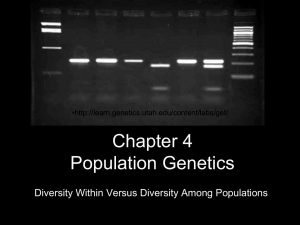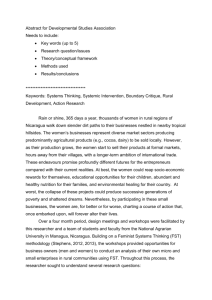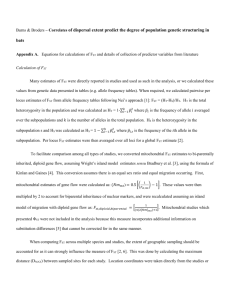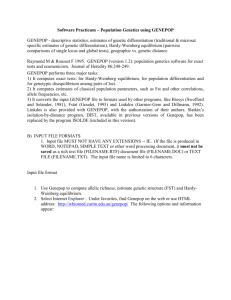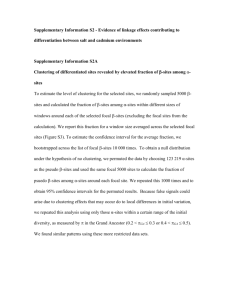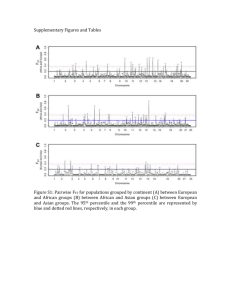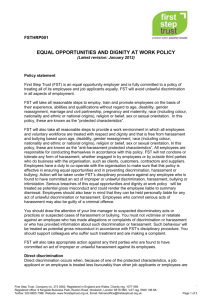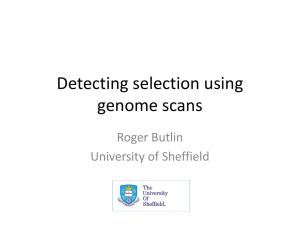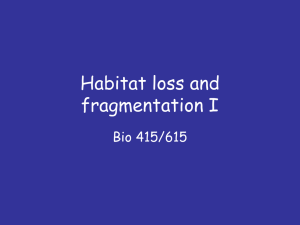A Professional Master`s in Food Safety and Technology (Master of
advertisement
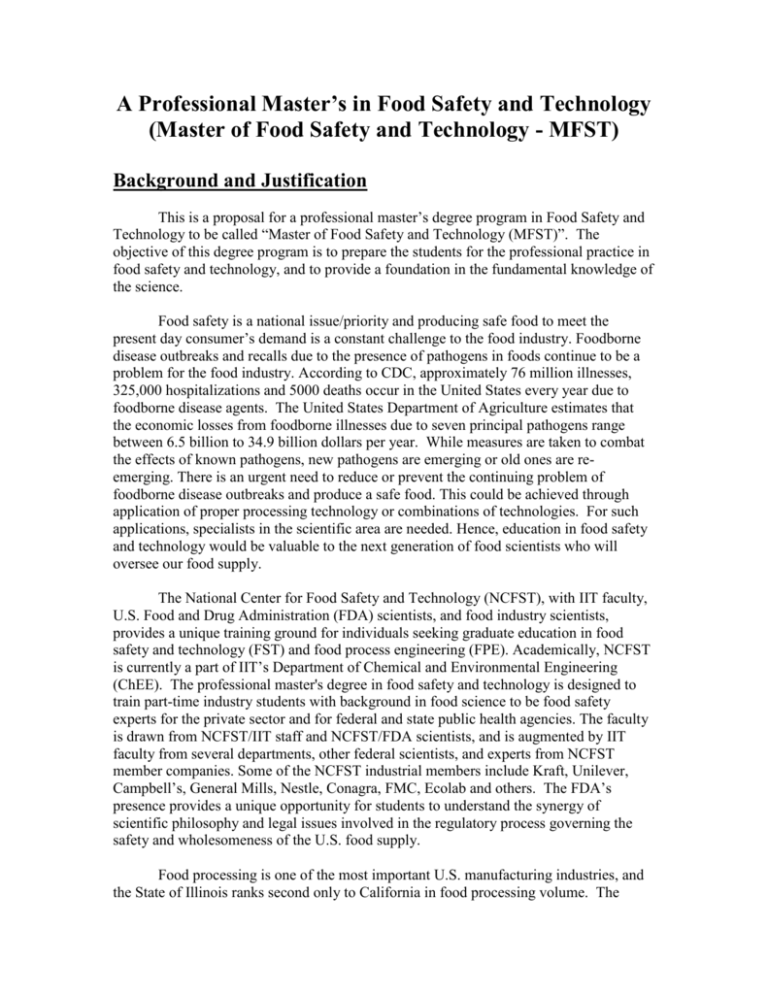
A Professional Master’s in Food Safety and Technology (Master of Food Safety and Technology - MFST) Background and Justification This is a proposal for a professional master’s degree program in Food Safety and Technology to be called “Master of Food Safety and Technology (MFST)”. The objective of this degree program is to prepare the students for the professional practice in food safety and technology, and to provide a foundation in the fundamental knowledge of the science. Food safety is a national issue/priority and producing safe food to meet the present day consumer’s demand is a constant challenge to the food industry. Foodborne disease outbreaks and recalls due to the presence of pathogens in foods continue to be a problem for the food industry. According to CDC, approximately 76 million illnesses, 325,000 hospitalizations and 5000 deaths occur in the United States every year due to foodborne disease agents. The United States Department of Agriculture estimates that the economic losses from foodborne illnesses due to seven principal pathogens range between 6.5 billion to 34.9 billion dollars per year. While measures are taken to combat the effects of known pathogens, new pathogens are emerging or old ones are reemerging. There is an urgent need to reduce or prevent the continuing problem of foodborne disease outbreaks and produce a safe food. This could be achieved through application of proper processing technology or combinations of technologies. For such applications, specialists in the scientific area are needed. Hence, education in food safety and technology would be valuable to the next generation of food scientists who will oversee our food supply. The National Center for Food Safety and Technology (NCFST), with IIT faculty, U.S. Food and Drug Administration (FDA) scientists, and food industry scientists, provides a unique training ground for individuals seeking graduate education in food safety and technology (FST) and food process engineering (FPE). Academically, NCFST is currently a part of IIT’s Department of Chemical and Environmental Engineering (ChEE). The professional master's degree in food safety and technology is designed to train part-time industry students with background in food science to be food safety experts for the private sector and for federal and state public health agencies. The faculty is drawn from NCFST/IIT staff and NCFST/FDA scientists, and is augmented by IIT faculty from several departments, other federal scientists, and experts from NCFST member companies. Some of the NCFST industrial members include Kraft, Unilever, Campbell’s, General Mills, Nestle, Conagra, FMC, Ecolab and others. The FDA’s presence provides a unique opportunity for students to understand the synergy of scientific philosophy and legal issues involved in the regulatory process governing the safety and wholesomeness of the U.S. food supply. Food processing is one of the most important U.S. manufacturing industries, and the State of Illinois ranks second only to California in food processing volume. The Chicagoland area has a high concentration of food processing and packaging plants and IIT is the major institution in the Chicago area to offer courses in food safety and technology. Over the last five years, enrollment in Food Safety and Technology (FST) has steadily grown (from 0 to about 12-15 students per course/per semester; three courses per semester). In addition, IIT’s Moffett Campus also has excellent laboratory facilities for teaching and research. At present, there is no separate track for students interested in a professional program in FST. To address these student and food industry needs, we propose the creation of a Master of Food Safety and Technology program, a course-based degree program in conjunction with the department of Biological, Chemical and Physical Sciences (BCPS). A similar separation of master’s degree programs has been in place for degree programs in Chemical and Environmental Engineering e.g., graduate programs in Food Process Engineering. Such a program will be valuable to part-time industry students without research interests who would not greatly benefit from a thesis. The non-thesis track would permit them to earn a Master’s degree faster. Graduates of the program will be prepared to assume responsible positions in food production/processing, food safety, sanitation, compliance and regulatory affairs, quality assurance, quality control, and R&D in the food industry. Other career options include positions in federal, state or local public health agencies and private public health organizations in policy-making, regulatory or research positions. Developmental Approach The new program would be developed within our current Master of Science, Food Safety and Technology program framework using existing courses and current faculty. The plan is to also add a new course covering the fundamentals of Food Science, which will be taught jointly by multiple faculty members in the Fall semester. We also plan to have at least one short course per year (on interesting special topics such as food defense, juice HACCP, high pressure processing and others) that the students can register for up to 2 credits. Due to the applied nature of the program, students in food safety and technology programs should consult with their faculty adviser to plan a program of study best suited to their background and interests. Courses can be taken from FST, BCPS and ChEE. To complete the program, all students would enroll in a set of 400 and 500 level courses for a total of 32 credit hours. Students are also encouraged to do a project. A fulltime student enrolled in the new program should be able to complete the program in about 1.5 years or 4 semesters. Completion of the program will provide sufficient knowledge in process and product development, food processing operations, packaging, food safety, Hazard Analysis Critical Control Point (HACCP), process and quality monitoring and control. Proposed Admission Requirements Admission requirements for the MFST degree program are the same as those for admission to the MSFST program. The requirements for admission into this program are the following: 1. A B.S. degree with a cumulative undergraduate grade point average of at least 3.0/4.0 or higher or the equivalent. 2. Minimum combined verbal and quantitative general GRE score of 900 and 2.5 in analytical writing. 3. A TOEFL score of 550 or higher for international students from non-English speaking countries. 4. Two letters of recommendation. Admission to the graduate program in food safety and technology requires the completion of a program leading to a bachelor's degree in food science and technology, agricultural engineering, chemical engineering, biology or related disciplines from an accredited institution. Prerequisites for the program are food science/food technology, food processing, chemistry, microbiology, calculus and statistics. Students without appropriate prerequisites are expected to take deficiency courses suggested by their academic advisers. Meeting the minimum GPA and test score requirements does not guarantee admission. Degree Requirements Part-time working students are generally expected to select this degree program. The requirements are the same as those for M.S. degree, with the following exceptions: At least 18 credit hours must be taken in 500-level courses in Food Safety and Technology, and the thesis work would be replaced by six to eight hours of course work or project work. The program requirements call for 32 credit hours of 400/500 level courses. The maximum number of credit hours allowed at the 400-level is 12. For short courses, a maximum of 6 credit hours is allowed. Out of the 32 credits, at least 15 credits must be selected from the core courses in food safety and technology listed below Required Courses FST 505 Food Microbiology FST 506 Food Microbiology Laboratory FST 507 Food Analysis FST 521 Food Process Engineering FST 541 Principles of Food Packaging New course- Fundamentals of Food Science Of the elective courses, at least 3 must be selected from the following FST courses: FST 507 Food Analysis FST511 Food Law and Regulation FST522 Advanced Food Process Engineering FST531 HACCP Planning and Implementation FST542 Principles of Food Packaging The remaining elective courses can be selected from other FST, FPE, or BCPS after consultation with an academic adviser. Course Descriptions Numbers in parentheses after course descriptions indicate weekly class, lab and total credit hours, respectively. Current Courses FST 505 Food Microbiology Microorganisms of importance to food safety, spoilage and food fermentations. Principles of occurrence and control. Importance of sanitation and prevention of public health problems. Microbiological contaminants and methods for their detection. Mechanisms of microbial inactivation. (3-0-3) FST 506 Food Microbiological Laboratory Basic microbiological techniques and safe laboratory practices. Introductory Food Microbioloigy. Isolation of pathogenic bacteria Spoilage microorganisms. Fermentation. Environmental Monitoring Rapid Identification tests. Sporeformers. This is currently a 2 credit hour course. The plan is to increase the credit hours of this course to 3. (1-3-2) FST 507 Food Analysis Techniques for analyzing food toxins, food constituents of public health concern, intentional and unintentional food additives, modern separation and analytic techniques. Prerequisites: chemistry, analytic chemistry. (2-3-3) FST 511 Food Law and Regulation Legal and scientific issues in regulating the nation's food supply and nutritional status. Rules of regulatory agencies; Federal Food, Drug and Cosmetic Act; definitions and standards for food and adulterated foods. Manufacturing processed foods in compliance with regulations. (3-0-3) FST 521 Food Process Engineering Food engineering fundamentals, heat transfer in food processing, food rheology, freezing of foods, food dehydration, kinetics of chemical reactions in foods, refrigeration and thermal process calculations, alternative methods of food processing. (3-0-3) FST 522 Advanced Food Process Engineering Process calculations for food processing methods such as canning, aseptic processing, ohmic heating, microwave processing and pulsed energy processing. Extrusion techniques in food processing. Discussion of new food processing techniques and safety implications. Prerequisite: FST 521 or permission of the instructor. (3-0-3) FST 531 HACCP Planning and Implementation Examination of the hazard analysis and critical control point (HACCP) principles; microbiological and process overviews; generic HACCP models, good manufacturing practices; monitoring of critical control points, process control and implementation. (3-03) FST 541 Principles of Food Packaging Types of packaging materials and equipment. Food-package interaction. Package testing to ensure safety. Special design considerations. Recycling of package materials. Migration. Active packaging. Irradiation of packaging materials. Regulatory issues influencing packaging. (3-0-3) FST 591 Research and Thesis Students conduct their research on a particular topic and write a thesis. Students are also expected to write manuscripts from their thesis work for publication. FST 593 Seminar on Food Safety and Technology Students attend seminars offered during the semester. Each student is also expected to give a 30-min presentation on a topic of his/her interest or a research project on which she/he had worked. FST 594 Special Projects Advanced projects involving analysis of food safety processing, packaging and biotechnology systems. (Credit: 1-6 hours) FST 597 Special Problems Independent study focusing on current problems or issues of professional relevance. Topics are selected from food safety, food process engineering, packaging, biotechnology. Repeatable to a maximum of four credit hours. (Credit: variable) We plan on offering one short course per year as part of special problems for 2 credits Courses that have been approved and will be taught in future FST 501 Biotechnology and Food Safety Applications of biotechnology and genetic engineering to the food industry, including the use of genetically modified microorganisms in fermentations and the production of flavors, colors and processing enzymes. Food safety and hazard analysis, legal aspects of new foods production. Prerequisite: biochemistry. (3-0-3) FST 523 Food Engineering Laboratory Pilot plant equipment overview, review of scientific instruments, data acquisition and control. Operational safety of pilot plant equipment use. (1-3-2) FST 526 Engineering Properties of Foods Study of physical, thermal, and electrical properties of food and biological materials. Importance in process design. Methods for property (physical, thermal and electrical) measurement. (3-0-3) FST 772 Design and Development of Food Products Methodologies for designing and developing food products, assessment of alternatives for low-fat, low-calorie food product alternatives, substitute ingredients, market evaluation, process modification. Development of prototypes, process optimization and evaluating consumer acceptance. Impact of microbiology, sanitation and nutrition on product development. New Courses FST Fundamentals in Food Science and Technology Important issues concerning storage and processing of all major American food commodities, including meats, grains, confections, vegetables, eggs and dairy. Relevant chemistry, physics and engineering required to understand common food related unit operations such as drying, freezing, sterilization and radiation treatments, Microbial and chemical issues of food quality and safety. Faculty Our current faculty, adjunct faculty and their research interests are listed (See Attachment). In addition, we have two instructors from industry. Dr. Alfredo Rodriguez teaches Advanced Food Process Engineering. He is an engineering specialist from Baxter Healthcare Corporation. He has worked on sterilization process engineering since 1984. His work includes developing mathematical models of the inactivation of bacterial spores due to moist-heat, ethylene oxide, high pressure processing, and modeling heat and mass transfer during sterilization. He is the author of the chapter on kinetics of spore inactivation in PDA’s book “Steam Sterilization – a Practitioners Approach”, and several peer reviewed scientific papers. Dr. Upasana Abbott teaches Food Analysis. She is a Food Chemist from Now Foods. Her research interests include single and multiple laboratory validation of analytical methods, detection of pesticide residues, microbial and environmental toxins in foods, and food product development to promote health and longevity. Some of our FDA scientists deliver guest lectures in some courses and are available to teach classes when needed. Drs. John Larkin, Greg Fleischman, and Mary Lou Tortorello of FDA/NCFST have given lectures in classes in the past. We also plan on having two more faculty join the staff in the near future, one as a joint appointment between NCFST and BCPS, and the other as a joint appointment between NCFST and ChEE. Once they are on board we will be able to offer more courses for our degree programs through them.
